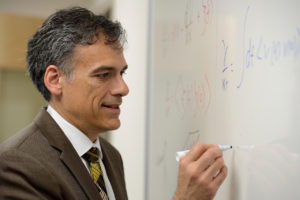
Nanoparticle models, macroscale impacts
Dr. Rigoberto Hernandez
Gompf Family Professor of Chemistry and Diversity Champion
Johns Hopkins University
Abstract:
The nanoparticles we make today to address problems in energy and human health will enter the environment tomorrow. Will they be benign or will they lead to deleterious downstream effects to our environment? Will those impacts change as the nanoparticles are transformed through their interaction with organisms or the environment? The Center for Sustainable Nanotechnology is developing and benchmarking design principles for sustainable nanoparticles. Our group contributes the theoretical and computational frameworks to bridge the molecular scale structure and motion to macro and meso scale behavior of nanoparticles in complex environments. At the molecular to meso scale, this includes contact of nanoparticles with model membranes and other constituents found in the cellular matrix. Our toolkit includes molecular dynamics, enhanced sampling, nonequilibrium statistical mechanics, coarse-graining, and machine learning. We will describe the spiral feedback between simulation and experimental collaborators that we are using to construct design principles for creating devices optimized for high performance and minimal environmental impact.
BIO:
Dr. Rigoberto Hernandez is the Gompf Family Professor in the Department of Chemistry at the Johns Hopkins University as of July 2016, and remains as the Director of the Open Chemistry Collaborative in Diversity Equity (OXIDE) since 2011. Before Hopkins, he was a Professor in the School of Chemistry and Biochemistry at Georgia Tech, and Co-Director of the Center for Computational Molecular Science and Technology he co-founded. He was born in Havana, Cuba and is a U.S. Citizen by birthright. He holds a B.S.E. in Chemical Engineering and Mathematics from Princeton University (1989), and a Ph.D. in Chemistry from the University of California, Berkeley (1993). His research area can be broadly classified as the theoretical and computational chemistry of systems far from equilibrium. His current projects involve questions pertaining to the diffusion of mesogens in colloidal suspensions and liquid crystals, fundamental advances in transition state theory, design principles for sustainable nanotechnologies and the dynamics of protein folding and rearrangement, and the design of autonomous computing machines. This work is supported by the NSF through a single-investigator grant, the CCI Center for Sustainable Nanomaterials, and a collaborative HDR Big Idea grant. The OXIDE effort is presently supported by the Sloan Foundation.
Dr. Hernandez is the recipient of a National Science Foundation (NSF) CAREER Award (1997), Research Corporation Cottrell Scholar Award (1999), the Alfred P. Sloan Fellow Award (2000), a Humboldt Research Fellowship (2006-07), the ACS Award for Encouraging Disadvantaged Students into Careers in the Chemical Sciences (2014), the CCR Diversity Award (2015), the RCSA Transformative Research and Exceptional Education (TREE) Award (2016), the Herty Medal (2017), the Stanley C. Israel Regional Award for Advancing Diversity in the Chemical Sciences (2018), and RCSA IMPACT Award (2020). He is a Fellow of the American Association for the Advancement of Science (AAAS, 2004), the American Chemical Society (ACS, 2010), the American Physical Society (APS, 2011), and the Royal Society of chemistry (FRSC, 2020). He was a Phi Beta Kappa Visiting Scholar in 2015-2016. He previously served as the as the District IV Director on the American Chemical Society Board of Directors (2014-2019). He currently serves on the Research Corporation SciaLog Selection Committee for Molecules Come to Life (2018-2021), the Sloan MPHD Advisory Committee, and the AAAS Committee on Opportunities in Science (COOS).